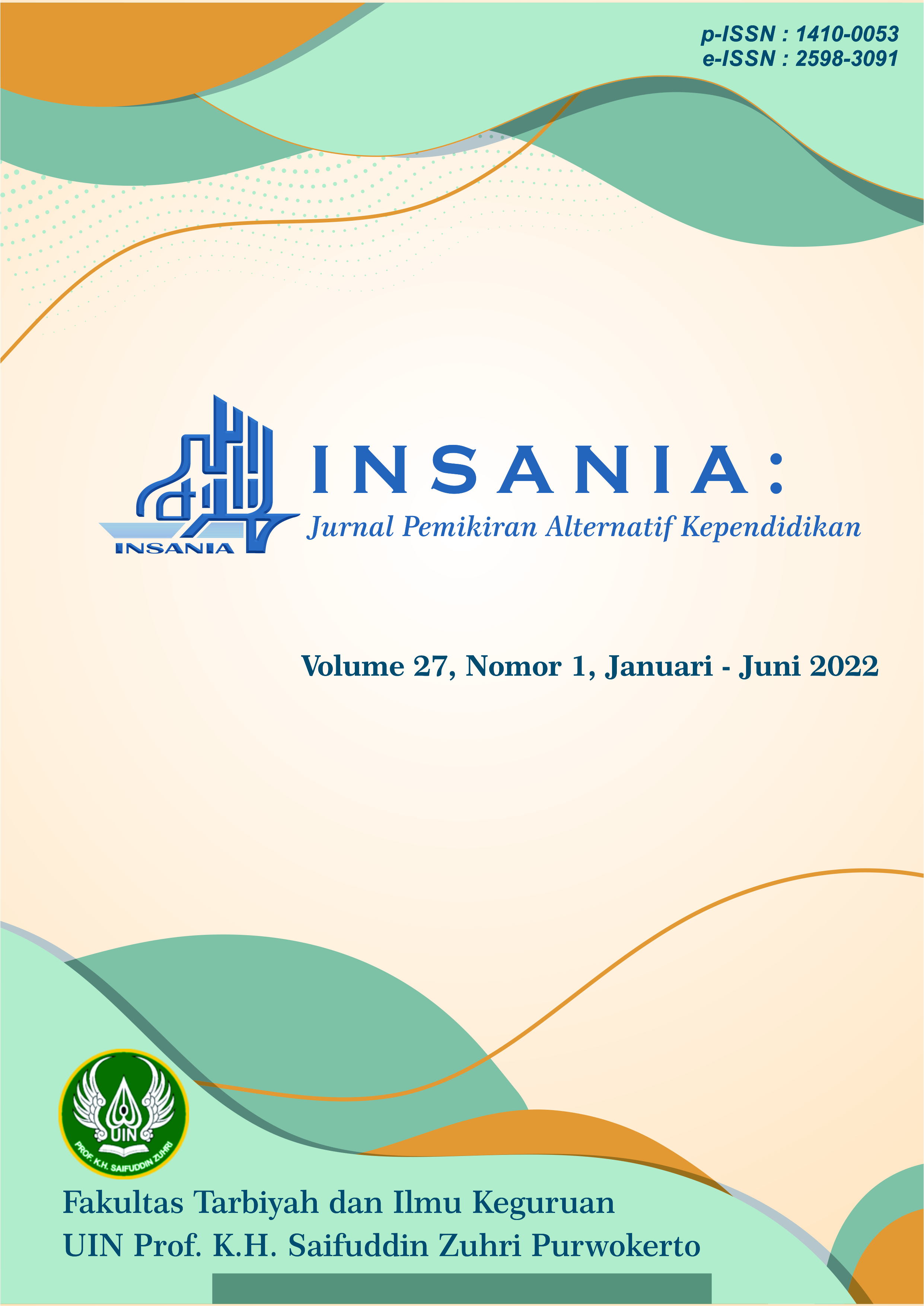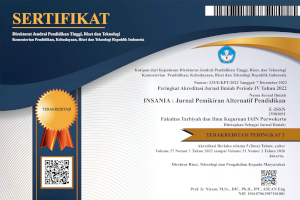Regular Class vs. Special Class: How Can They Differ in English Achievement and Technology Usage?
DOI:
https://doi.org/10.24090/insania.v27i1.6507Kata Kunci:
English learning achievement, regular classes, special program classes, technology usageAbstrak
Providing educational programs provides specific opportunities for better student progress. MTs Negeri 1 Boyolali offers two kinds of programs that can be chosen according to the wishes, abilities, and goals. The two programs are the regular class program and the special class program. These two programs can highlight their technology usage and English learning achievement, considering they come from different programs. Therefore, this study aims to find out whether there are differences in English learning achievement or not between the two programs. This study uses ,a mixed method; statistically collecting and analyzing the students' final semester tests results, and interviewing the teacher and students to clarify some data. Besides, an additional intervies investigates further technology usage during English learning. The data shows differences in English learning achievement and technology usage between students from regular and special class programs. The research is expected to be limited to find the differences between the two classes and to contribute ideas to all related education implementers. Ultimately, regular class students will have English skills that are not much different from students in special classes.Unduhan
Referensi
Bahasoan, A. N., Wulan Ayuandiani, Muhammad Mukhram, & Aswar Rahmat. (2020). Effectiveness of Online Learning In Pandemic Covid-19. International Journal of Science, Technology & Management, 1(2), 100–106. https://doi.org/10.46729/ijstm.v1i2.30
Elisa, P., Ningsih, A., & Sari, M. N. (2021). Are Learning Media Effective in English Online Learning ?: The Students’ and Teachers’ Perceptions. 17(2), 173–183. https://doi.org/https://doi.org/10.32939/tarbawi.v17i2.1012
Fira, F. L. A., Ulfatin, N., & Benty, D. D. N. (2020). Strategi Pemasaran Jasa Pendidikan Dalam Menarik Minat Masyarakat Melalui Program Kelas Khusus. Jurnal Administrasi Dan Manajemen Pendidikan, 3(3), 249–261. https://doi.org/10.17977/um027v3i32020p249
Habibi, I. (2020). Implementasi Pembelajaran Pendidikan Agama Islam Berbasis Daring (Whatsapp Group, Google Classroom Dan Zoom Meeting). CENDEKIA: Media KomunikasiPenelitian dan PengembanganPendidikan Islam, 12(02), 161–178. https://doi.org/10.37850/cendekia. V12i2.134
Hakim, L. (2021). Manajemen Program Kelas Unggulan untuk Meningkatkan Citra Madrasah Tsanawiyah 1 Kabupaten Madiun. Southeast Asian Journal of Islamic Education Management, 2(1), 1–14. https://doi.org/10.21154/sajiem.v2i1.37
Kustanti, Dewi & Prihmayadi, Y. (2017). Problematika Budaya Berbicara Bahasa Inggris. Jurnal Budaya Berbicara Bahasa Inggris, 14(1), 1–15. https://doi.org/https://doi.org/10.15575/al-tsaqafa.v14i1.1798
Lastriawati, U. (2015). Perbedaan Kepercayaan Diri Antara Siswa Kelas Plus dengan Reguler di SMA Negeri 6 Padang Sidimpuan [Undergraduate's Thesis, Universitas Medan Area]. http://repository.uma.ac.id/handle/123456789/636
Lina, M. F. (2019). Gender and Age: Language Use in Tv Series & the Impact To English Learning. Journal of Pragmatics Research, 1(2), 100–117. https://doi.org/10.18326/jopr.v1i2.100-117
Lina, M. F. (2021). INSANIA : Jurnal Pemikiran Alternatif Kependidikan Maximizing WhatsApp Group for Students Group Presentation in Learning English Online A . Introduction. 26(2), 15–30. https://doi.org/10.24090/insania.v26i2.5237
Marsudi, C. (2021). Students’ Perception on Online English Learning and Their Achievement During Covid 19 at SMK Manajemen Penerbangan Medan. Proceedings of the Eighth International Conference on English Language and Teaching (ICOELT-8 2020), 579, 271–275. https://doi.org/10.2991/assehr.k.210914.051
Muhid, A., & Mukarromah, A. (2018). Pengaruh Harapan Orang Tua dan Self-Efficacy Akademik terhadap Kecenderungan Fear of Failure pada Siswa: Analisis Perbandingan antara Siswa Kelas Unggulan dan Siswa Kelas Reguler. Jurnal Darussalam: Jurnal Pendidikan, Komunikasi Dan Pemikiran Hukum Islam, 10(1), 31–48. https://doi.org/10.30739/darussalam.v10i1.266
Oweis, T. I. (2018). Effects of Using a Blended Learning Method on Students’ Achievement and Motivation to Learn English in Jordan: A Pilot Case Study. Education Research International, 2018, 1–7. https://doi.org/10.1155/2018/7425924
Panji, A. K. D. (2016). Prestasi Belajar Antara Siswa Program Khusus dan Reguler (Studi Komparasi di MTs Negeri 1 Surakarta Tahun 2016) [Undergarduate's Thesis, Universitas Muhammadiyah Surakarta]. http://eprints.ums.ac.id/48906/
Putro, S. T. (2020). Problematika Pembelajaran di Era Pandemi COVID-19 Stud Kasus: Indonesia, Filipina, Nigeria, Ethiopia, Finlandia, dan Jerman. Geomedia: Majalah Ilmiah Dan Informasi Kegeografian, 18(2), 50–64. https://doi.org/10.21831/gm.v18i2.36058
Santoso, S., & Hidayati, R. (2021). Analisis komparatif self confidence siswa kelas khusus dan kelas reguler. Jurnal Konseling Dan Pendidikan, 9(1), 36–43. https://doi.org/10.29210/158200
Sari, F. M., & Oktaviani, L. (2021). Undergraduate Students’ Views on the Use of Online Learning Platform during COVID-19 Pandemic. Teknosastik, 19(1), 41–47. https://doi.org/10.33365/ts.v19i1.896
Sugiyono. (2019). Metode Penelitian Kuantitatif Kualitatif. Alfabeta.
Susilawati, S., & Supriyatno, T. (2020). Online Learning Through WhatsApp Group in Improving Learning Motivation in the Era and Post Pandemic COVID-19. Jurnal Pendidikan: Teori, Penelitian, dan Pengembangan, 5(6), 852–859. http://dx.doi.org/10.17977/jptpp.v5i6.13670
Yunianti, A. L., & Budiani, M. S. (2016). Perbedaan Kemampuan Komunikasi Interpersonal Siswa Kelas Unggulan dan Siswa Reguler. Jurnal Psikologi Teori Dan Terapan, 7(1), 62–72. https://doi.org/10.26740/jptt.v7n1.p62-70
Unduhan
Diterbitkan
Cara Mengutip
Terbitan
Bagian
Lisensi
Authors who publish with this journal agree to the following terms:
Authors retain copyright and grant the journal right of first publication with the work simultaneously licensed under a Creative CommonsAttribution-ShareAlike License that allows others to share the work with an acknowledgment of the work's authorship and initial publication in this journal.
Authors are able to enter into separate, additional contractual arrangements for the non-exclusive distribution of the journal's published version of the work (e.g., post it to an institutional repository or publish it in a book), with an acknowledgment of its initial publication in this journal.
Authors are permitted and encouraged to post their work online (e.g., in institutional repositories or on their website) prior to and during the submission process, as it can lead to productive exchanges, as well as earlier and greater citation of published work (See The Effect of Open Access).









